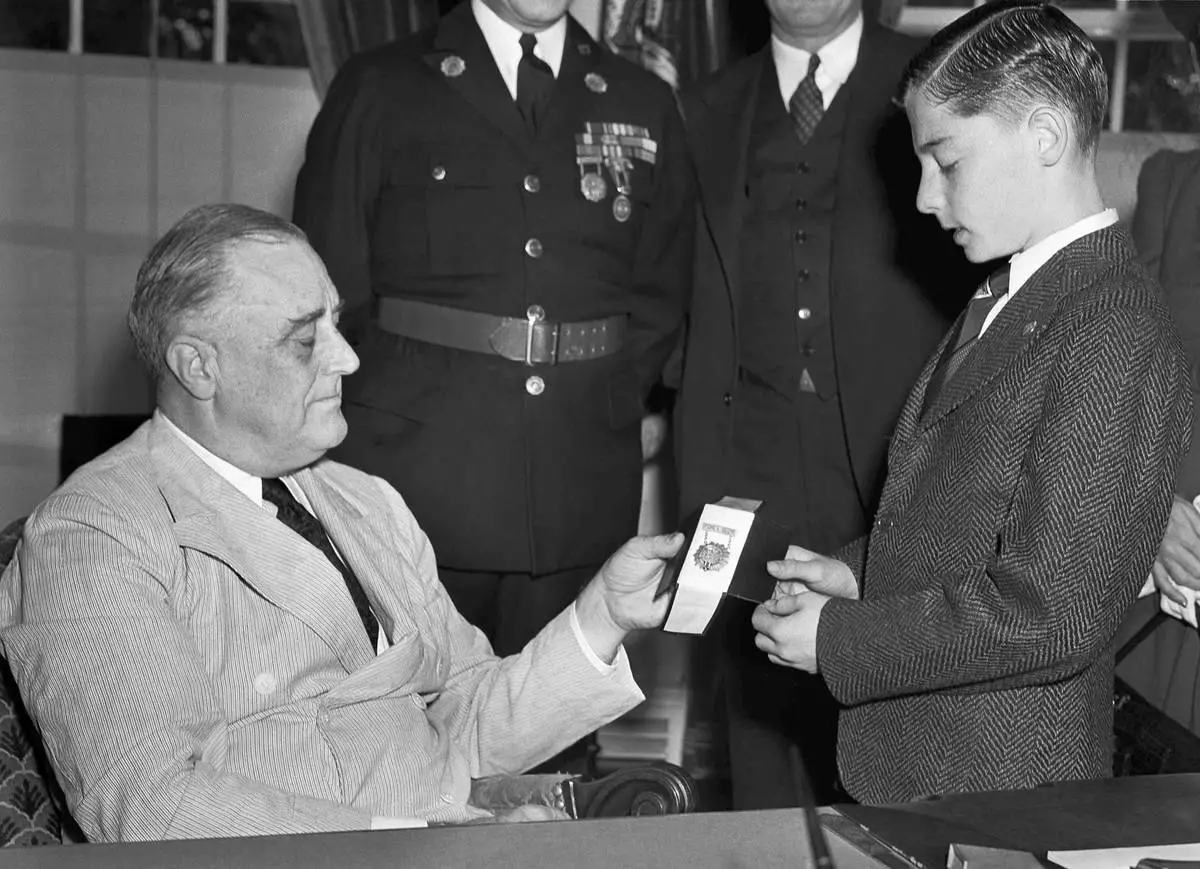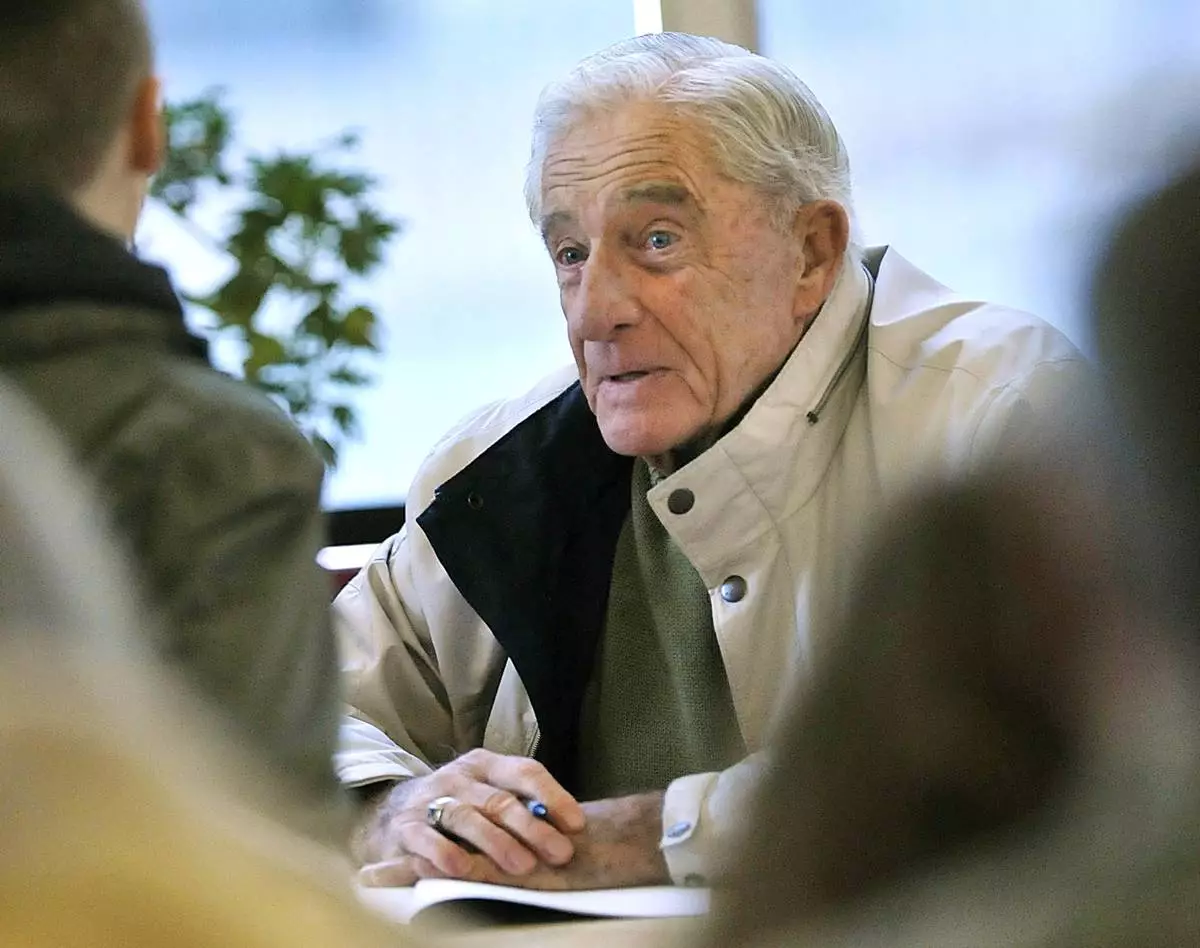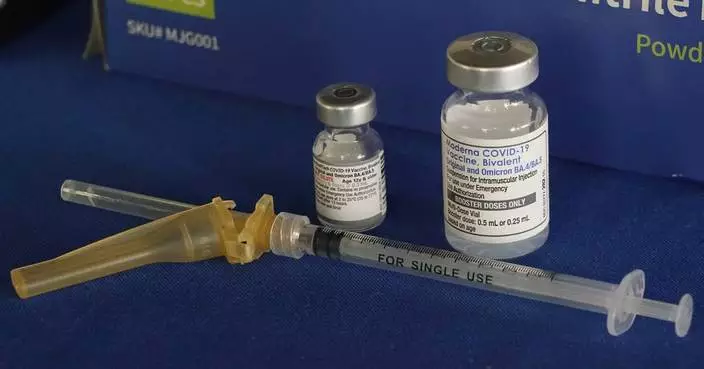ATLANTA (AP) — Donald Trump has made his opposition to transgender rights central to his closing argument before Election Day, using demeaning language and misrepresentations to paint an exceedingly narrow slice of the U.S. population as a threat to national identity.
The former president and Republican nominee’s campaign and aligned political action committees have spent tens of millions of dollars on advertising that attacks Democratic nominee and Vice President Kamala Harris for her previous statements supporting transgender rights.
His rally speeches now feature a spoof video mocking trans people and their place in the U.S. military. The montage, interspersed with clips of the Vietnam War movie “Full Metal Jacket,” typically draws loud boos at his rallies, as do Trump's false claims about female athletes and his mocking impression of what he says is a trans woman lifting weights.
“We will get ... transgender insanity the hell out of our schools, and we will keep men out of women’s sports,” Trump said at his recent Madison Square Garden rally, drawing an approving roar from the crowd of 20,000-plus. He regularly claims, falsely, that “your kid goes to school and comes home a few days later with an operation” changing their sex.
Trump's running mate, JD Vance, alleged Thursday that white teenagers in the “middle class or upper-middle class” can identify as transgender to more easily get into elite universities.
“Is there a dynamic that’s going on where if you become trans, that’s the way to reject your white privilege?” Vance told podcaster Joe Rogan, citing conservative anger about affirmative action and other programs geared toward historically disenfranchised groups. “That’s the only social signifier,” Vance continued, “the only one that is available in the hyper-woke mindset, is if you become gender nonbinary.”
While often overshadowed by his emphasis on migrants, Trump's broadsides against LGBTQ people have seemed to grow more frequent and ominous in the campaign's final days, intended both to stir his core supporters and coax votes from more moderate voters who may not mesh with Trump on other matters. It's part of an overall campaign in which Trump has pushed his own brand of hyper-masculinity, most recently referring several times to CNN anchor Anderson Cooper, who is gay, by a woman’s name, “Allison Cooper.”
Harris has largely ignored Trump’s attacks but has pushed back on his characterization of her stances, noting that federal policy giving U.S. military personnel access to gender-affirming medical care and transgender surgery was in place during Trump’s presidency.
“I will follow the law,” Harris said in a Fox News interview on Oct. 17. “And it’s a law that Donald Trump actually followed. You’re probably familiar with now. It’s a public report that under Donald Trump’s administration, these surgeries were available on a medical necessity basis, to people in the federal prison system.”
On “The Breakfast Club” podcast earlier this week, she added that Trump was “living in a glass house” with his attacks. She compared the number of people involved: She said two U.S. service members have sought transgender surgery, while millions of people could be stripped of their health insurance if Trump and Republicans succeed in their efforts to repeal the Affordable Care Act.
Harris' campaign aides, meanwhile, see Trump’s approach as appealing only to hardline supporters already behind him, thus ceding issues, especially the economy, that resonate with many more voters who are not interested in another culture war battle.
Polling suggests a divided electorate on transgender rights. About half of Americans, 51%, say changing one’s gender is morally wrong, according to a Gallup poll from May. About 7 in 10 Americans say transgender athletes should only be allowed to compete on sports teams that match their birth gender, according to a 2023 Gallup poll. Yet about 6 in 10 Americans oppose laws that ban treatments and medical procedures that help transgender individuals align with their gender identity, according to a Gallup poll from May. About one-third favor such bans.
Civil rights advocates, meanwhile, express concerns over what a second Trump administration would mean for LGBTQ rights, and say his campaign messaging already threatens the security of transgender people, regardless of who prevails.
Trump has vowed to target transgender people if elected. He has said he would ask Congress to pass a bill stating there are “only two genders” and to ban hormonal or surgical intervention for transgender minors in all 50 states.
Sarah Kate Ellis, president of the LGBTQ advocacy group GLAAD, said Trump's approach attacks “vulnerable people” who make up about 1% of the population “and already are marginalized” by much of society.
“Why are we debating trans people's medical care? Because there's a lack of understanding, and there's a lack of humanizing about who trans people are,” Ellis said. “It's not easy to be transgender, to wake up every day in a body that might not fit who you are, and instead of having empathy, they're met with hostility. That's the culture Trump is creating.”
Writer and activist Charlotte Clymer added on the social media platform X: “It really ... sucks to watch any sports event as a trans person right now because of the Trump commercials, and I just need everyone to know that: yes, we do see the ads, and it's demoralizing to know this entire subset of people sees us as subhuman.”
Indeed, Trump’s campaign has since Sept. 1 spent about $35 million airing three ads based on statements Harris made in 2019 as a candidate for Democrats’ 2020 presidential nomination. Clips show Harris affirming her support for federal policies that allow federal prisoners access to medical care including gender-affirming hormone treatments and, potentially, transgender surgery.
“It sounds insane because it is insane,” the announcer states in an ad that, as of Thursday, had aired almost 28,000 times across presidential battlegrounds and national television. “Kamala’s agenda is ‘they-them,’ not you,’” the ad concludes, referring to non-gender-specific pronouns.
Harris, in her 2019 presidential campaign, wrote in an ACLU questionnaire, “I support policies ensuring that federal prisoners and detainees are able to obtain medically necessary care for gender transition, including surgical care, while incarcerated or detained.”
She also worked as California attorney general to grant access to such care for state prisoners. But Harris is correct in noting that similar federal policies were in place under Trump’s presidency, both for immigrant detainees and federal prisoners.
At Trump's rallies, he often addresses LGBTQ issues with generalizations and emotional appeals. He routinely blasts U.S. military leaders for being “woke,” blaming Harris and President Joe Biden.
The spoof video that is played on screens at Trump's rallies alternates between scenes of intense military training, sometimes with drill sergeants yelling at troops, and scenes depicting what are supposed to be LGBTQ members of the military, each displaying exaggerated feminine affects. The latter scenes, the video states, reflect the U.S. military under Biden and Harris.
By the time Trump takes the stage, multiple speakers have primed the audience on the issue.
“We’re in the middle of a national identity crisis. Faith in God, patriotism, hard work, family -- these things have disappeared only to be replaced by ‘wokeism’ and transgenderism” and other philosophies, said former Republican presidential candidate Vivek Ramaswamy at Madison Square Garden. “These are symptoms of a deeper void of purpose and meaning in our country, and right now we need to step up and fill that void with our own vision.”
Associated Press writer Linley Sanders in Washington contributed to this report.
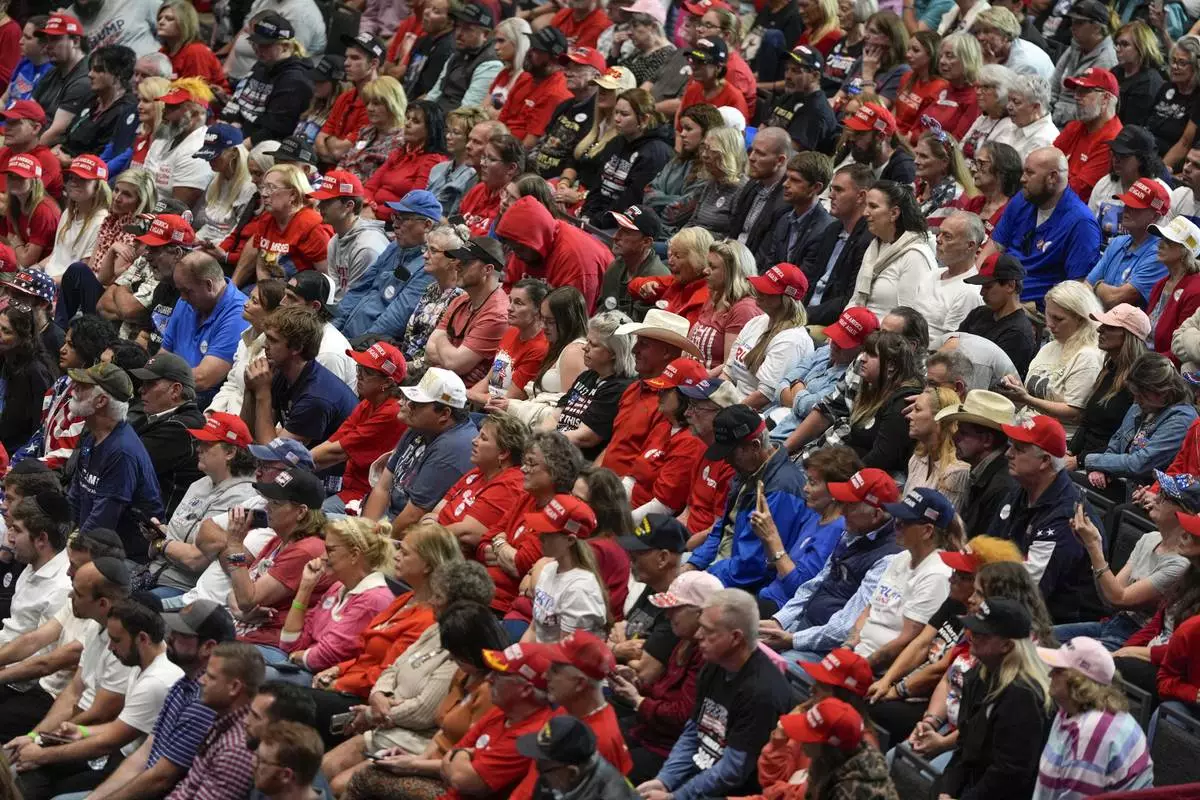
Supporters listen as Republican presidential nominee former President Donald Trump speaks at a campaign rally at Rocky Mount Event Center, Wednesday, Oct. 30, 2024, in Rocky Mount, N.C. (AP Photo/Julia Demaree Nikhinson)
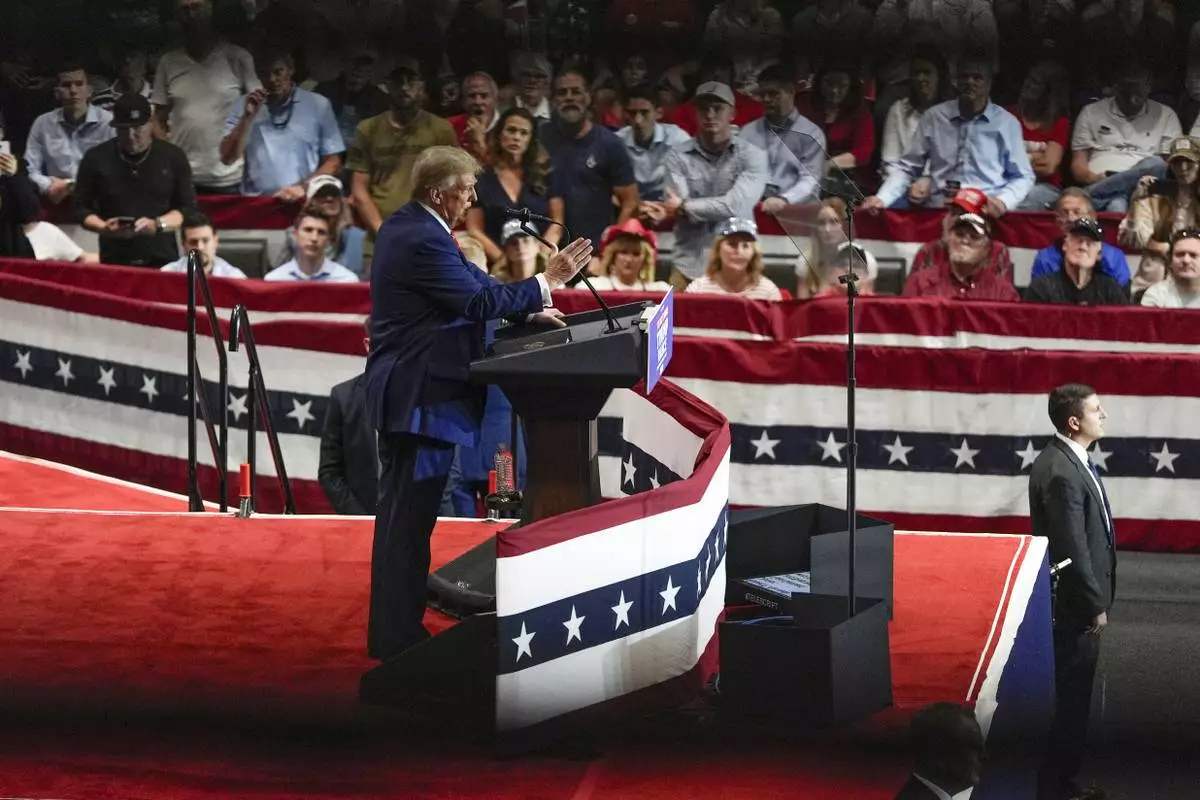
Republican presidential nominee former President Donald Trump speaks at a campaign rally at Rocky Mount Event Center, Wednesday, Oct. 30, 2024, in Rocky Mount, N.C. (AP Photo/Julia Demaree Nikhinson)

Republican presidential nominee former President Donald Trump watches as a video plays during a campaign rally at Greensboro Coliseum, Tuesday, Oct. 22, 2024, in Greensboro, N.C. (AP Photo/Alex Brandon)



